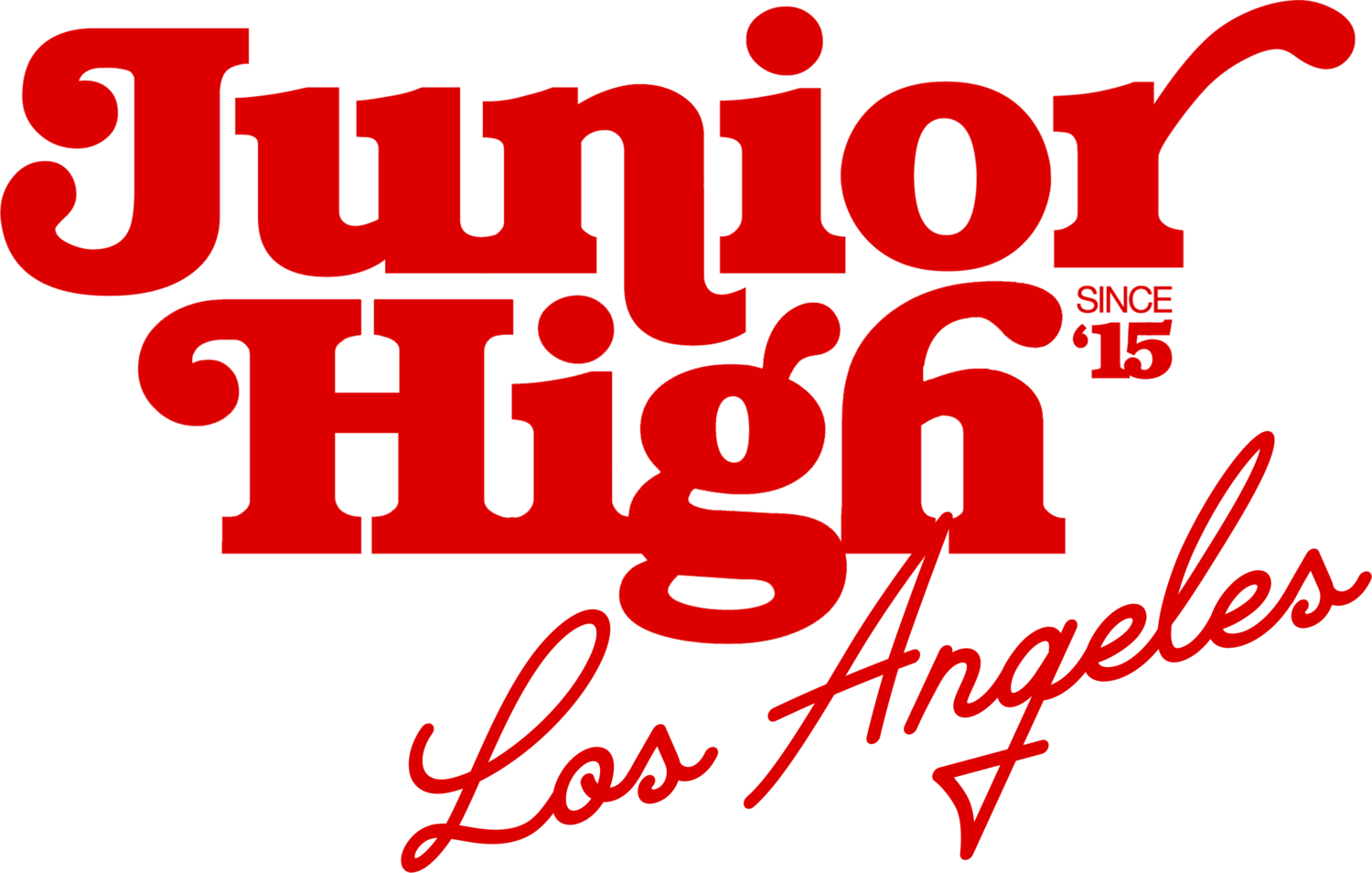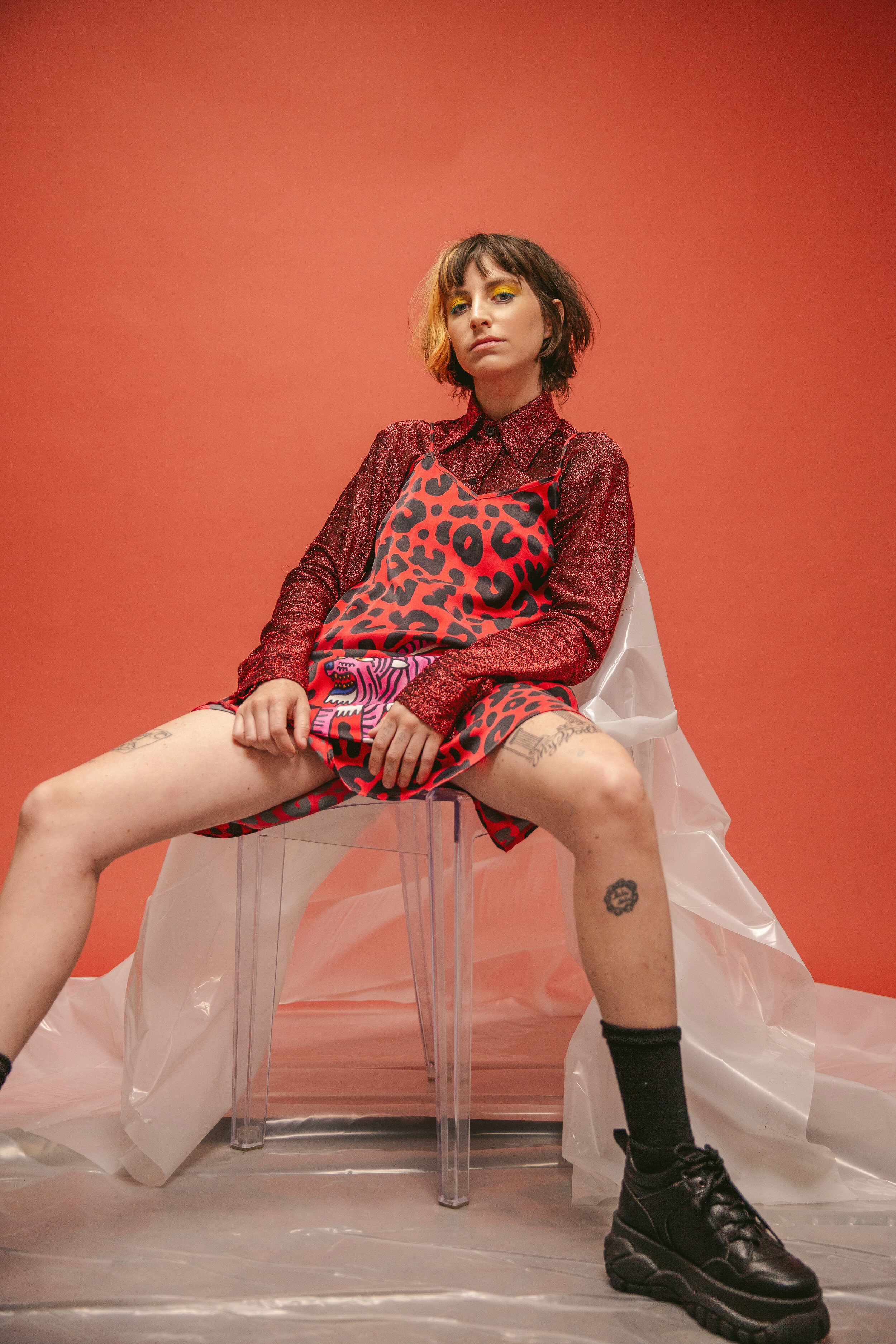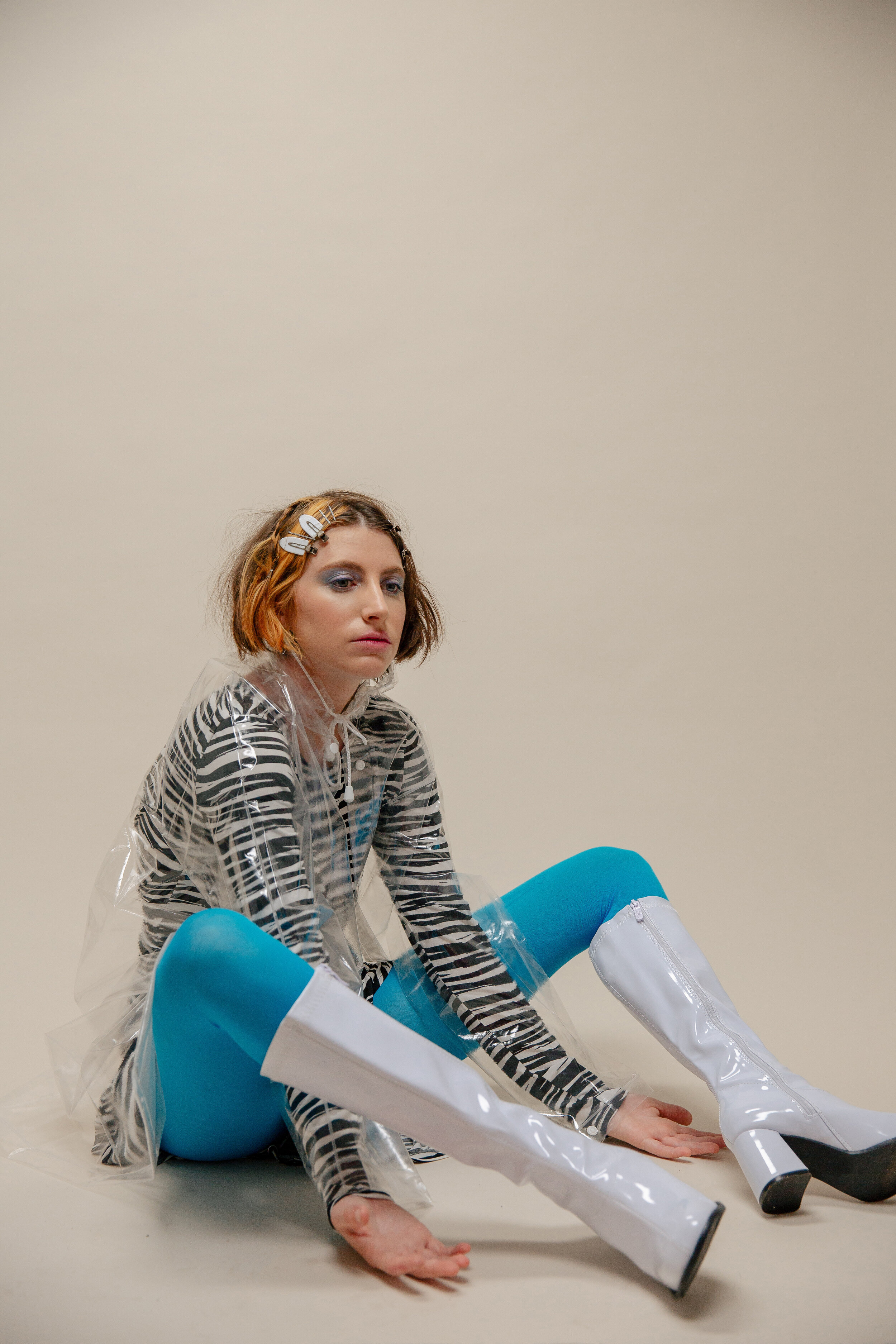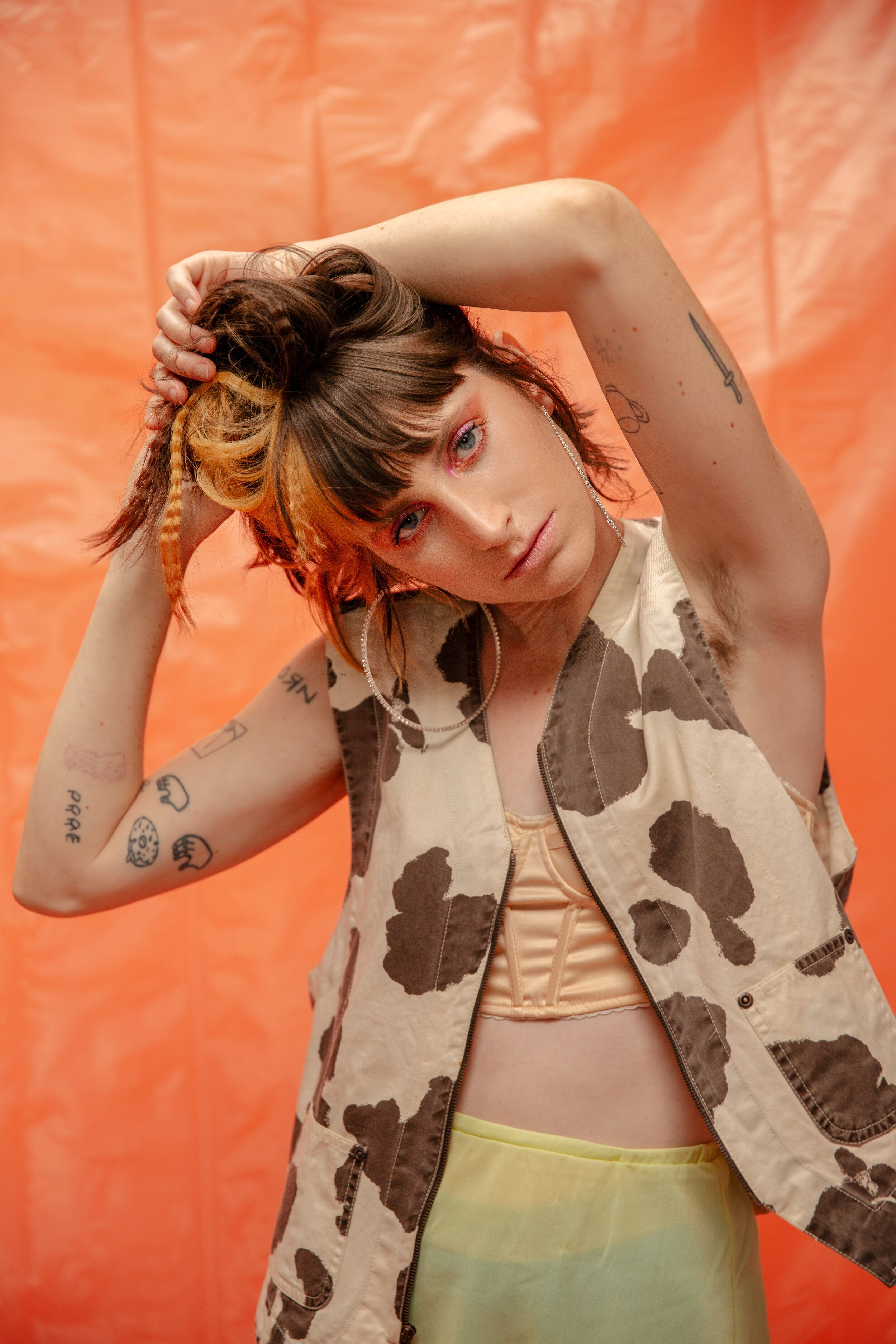Ian Sweet
⤏ JILIAN MEDFORD IN CONVERSATION WITH NICOLE SNYDER
⤏ PHOTOS BY ALIX SPENCE | MAKE-UP BY ALEX FRENCH | STYLING BY LINDSEY HARTMAN | PHOTO ASSISTING BY ASHTON RAE
⤏ ORIGINALLY PUBLISHED DECEMBER 2018
NICOLE SNYDER: So your new album, Crush Crusher, just came out a few weeks ago, but it’s been two years since your last record was released. Does that stress you out?
JILIAN MEDFORD: It really does stress me out, in a kinda good way, I guess. This is more of a solo record now because I didn’t write this record with anybody else. I just did it myself, whereas the last record was with bandmates. I ended up doing it because my drummer and I had a huge falling out. He was making insanely misogynistic comments to me about my playing style and my performances and stuff. I just lost track of feeling good about playing music and feeling confident at all. So making this a solo record and making this project solo again was super stressful, definitely. But it pushed me to write some of the best songs, or the most honest songs I’ve ever written.
NS: The process of writing a song and then releasing an album can be really long. Listening back to the album, is there anything that surprises you now about the way it turned out or the way you were feeling at the time?
JM: Yeah. Writing and recording the record, I think I was feeling one way about some particular things in my life. And then once the record came out, those things and mostly the relationship I was in, had ended or was ending. So when I look back and when I listen to the songs, they were kind of these weird premonitions of that relationship or like, wanting to escape from it. So I think I had hidden things in there for myself to reflect back on, or something.
NS: In writing songs like “Spit” or “Crush Crusher” where there’s this sense of impending doom, do you think you’re creating a self-fulfilling prophecy? Or were you just getting ahead of yourself in a psychic way?
JM: It’s kind of both. I think I wanted to get out of that toxic environment and relationship, so I was trying to see that through songwriting. Through the process of writing and hearing it over and over again, kind of like a meditation. So, yeah, they kind of are self-fulfilling prophecies, which is maybe weird to say. When we play them live, the songs adapt. You kind of relate whatever the song is to what’s currently happening in your life so you can emotionally connect to it.
NS: What does self-care look like to you on tour?
JM: Finding dogs. Finding the most possible dogs, either on the street, or if we stay with a dog, that’s where I’m spending the night. I’m not talking to anybody else. That, and standing in the shower for too long, even if everybody else has to take a shower. Also, finding weird hats and stuffed animals on tour. Just stuff that I can’t find elsewhere that makes being somewhere specific feel special.
NS: Aw. I like that. I saw on your Instagram that you won a stuffed animal from a claw machine.
JM: I did! I was also having the worst day that day. I was like, “I need this!” and I manifested it. I try a claw machine everywhere I go. That’s also self-care. I believe that.
NS: There’s a decent amount of religious imagery on this record. What’s your relationship with religion?
JM: Yeah, accidentally, there is some religious imagery. I was raised Jewish, but super reformed. I have no relation to religion or spirituality, really at all. I have an infatuation with the idea of other people’s obsession with Jesus and never really being able to understand that growing up. It’s not ironic — I’m not making fun of anybody’s religion, but the song “Holographic Jesus” is about actual holographic Jesus posters that I collect from 99-cent stores. I collected a bunch of them and hung them all over my room, and was just so interested by the idea of one huge figure that is everything to everybody. I wonder sometimes if religion is something that would help me. I’m curious how it does help people.
" . . . if we stay with a dog, that's where I'm spending the night."
NS: Something I’ve been thinking about a lot lately is the difference between taking agency in your own life versus being more on the passive end of the spectrum where you’re letting things happen to you. Is making and performing music something you feel you’ve actively pursued, or something that sort of happened to you?
JM: I’ve always been actively pursuing music because there’s no other outlet for me to actually do something for myself. I guess there’s therapy…I don’t do a lot of things for myself so music is the thing that I do for myself and performance is the thing that I do for myself. So I have to stay on top of it, for mental health. I just have to do it and remain in it. The moment that I get lazy about it, I feel like shit. When I’m not playing music I’m like, “I can just relax, it’s fine!” But then I’m like, “Why do I feel terrible?” It’s like, oh, right. I need to be doing the thing that actually makes me feel the best.
NS: I’m always so jealous of people like you. I know that I enjoy playing music and it’s something that I miss doing at this point, but it’s so hard for me to actively work on it, for whatever reason.
JM: I really understand that. I go through intense phases like that, too, where it’s just so difficult for me to even think about playing guitar.
NS: You went to Berklee [College of Music], right?
JM: I did. I think that’s why I feel that way.
NS: I was gonna say — how do think a formal music education shaped your practices or the way you view making music for a living?
JM: Going to Berklee was really difficult. It was really beneficial as far as learning work ethic, but I was struggling with their curriculum and the way they approach success and practice routines. It’s just very harsh and doesn’t feel natural to practice something you love that intensely. It’s probably beneficial to people who want to be top-tier studio musicians or composers, but as far as a performer and a songwriter, I think you shouldn’t necessarily be practicing scales. You don’t need to practice scales to be a good songwriter. You don’t need to do Verse / Chorus / Verse / Chorus / Bridge / Chorus to be an amazing songwriter. I definitely had struggles with the idea of “what it takes to succeed” that was made known by the Berklee curriculum. So I was always trying to do the best I could in school, but then create my own boundaries outside of it for myself and not get too caught up in their idea of how music should work. But it does make me question, what does practicing mean? I never practice scales, I don’t necessarily always warm up my voice.
NS: I think it’s more just about everyone finding what works for them. Do you have any pre-show rituals or superstitions?
JM: Not really. I kind of just like to have a moment of quiet, or sit in the bathroom on my phone for a minute.
NS: I feel like most of tour, for me, is sitting in the bathroom on my phone. It’s the only way to have privacy.
JM: It’s the only place, right? Like in the green room I’m not actually gonna be alone.
NS: You moved from Boston to New York to LA. How do you feel like living in LA has changed the way you write music and fit into the local music scene?
JM: Good question. It definitely opened up the way I write music. I love New York, but when I was living there, I was struggling to find any sort of space by myself to be creative. I felt like I was always being watched or heard or someone was interrupting me. It was very sporadic and not constant, and I was always insecure. When I was living in an apartment, it had such thin walls and everyone could hear everything everyone was doing so I wasn’t feeling like I could totally be free creatively. It’s like your mom busting into your room when you’re writing a super emotional song and you’re like, “Get out!” [Laughs].
NS: Did that happen to you?
JM: As a child, yeah. But when I moved to LA, I moved into a house that had a lot more space. I felt a lot fresher and bright-eyed. Even though I grew up [in LA], coming back home after being gone for so long, I had a whole new love and appreciation for it. So it felt really comfortable being there. What was the second half of the question?
NS: How do you feel you fit into your local music scene?
JM: Dude, it’s way harder for me to fit into the LA music scene.
"I haven't totally figured out where I fit in yet."
NS: Yeah. I don’t really even know what the LA music scene is at this point.
JM: There are a lot of bands that I love but, as any music scene is, it’s kind of cliquey. I don’t necessarily play a lot of shows all the time. I had a record coming out when I moved there, so I had to wait until my release show to play a show and I didn’t really get an opportunity to play shows with other bands. But at the same time, I’m not really sure where I would fit in. I really like going to shows at Zebulon now because they’re a little bit on the stranger side and more curated. It kind of reminds me of the east coast, which I love. I love that aspect of the east coast — the music scene is so diverse. So is LA, it has all its different corners and stuff, but I’m still figuring it out. But I haven’t totally figured out where I fit in yet.
NS: Sometimes I don’t even know where to go to shows. Or people will text me and say, “Hey, we’re going on tour, who should we play with in LA?” and I honestly have no idea.
JM: I know! It’s interesting.
NS: Let’s get into some lighter questions. Has anyone ever approached you at a show thinking your name is Ian Sweet?
JM: One hundred percent. Or just saying, like, “Hey, Ian”’ or asking “Who’s Ian?”
NS: What’s your favorite movie?
JM: Maybe Princess Mononoke? That’s a classic.
NS: What’s your sign?
JM: Taurus!
NS: You just like luxury, and you’re stubborn. Right? Those are the big takeaways?
JM: Yeah! I’m like, “Get me that freakin’ Airbnb, or else!” [Laughs]
NS: That’s rough for a touring musician. Good luck with that. Fuck / Marry / Kill: Anxiety, Depression, and Loneliness.
JM: Oh my god. Fuck…depression. Marry loneliness, because I’m better off just marrying myself. And kill anxiety.
NS: Fuck / Marry / Kill: Korn, Coldplay, or Bjork?
JM: I knew Korn was gonna come up in this conversation!
NS: It had to!
JM: Marry Coldplay. Fuck Bjork, and kill Korn! I feel like Korn wants to get murdered. That’s like, their thing.
NS: Yeah, that’s hot. The last question I have…I read somewhere that you play tennis with your musician friends. So I’m just wondering, as a former varsity tennis player, why haven’t I been invited?
JM: [Laughs] Are you serious? Dude, we have to play.
NS: I’m super down!
JM: I was on the varsity team too, in high school!
NS: Were you really?
JM: Yes! We need to get trading cards made with our old photos.
⤏ BUY THE PRINT EDITION OF JR HI THE MAGAZINE | ISSUE 004 AND A LIMITED EDITION IAN SWEET TRADING CARD HERE.
⤏ NICOLE SNYDER (SHE/HER) IS A FORMER TOURING MUSICIAN FROM PHILADELPHIA, WHO HAS PLAYED IN SLUTEVER, UPSET, COLLEEN GREEN, PEACH KELLI POP, AND TWO BLINK-182 COVER BANDS. NOW SHE’S TRAINING TO BECOME A THERAPIST IN LOS ANGELES, WHERE SHE LIVES WITH HER PET CHIHUAHUA AND CRIPPLING ANXIETY.




